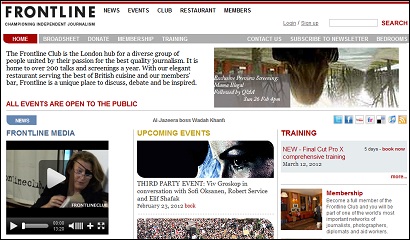The founder of the Frontline Club, Vaughan Smith, is asking freelance journalists around the world to take part in a survey about the physical risks of their work.
The survey is aimed at freelance camera operators, video journalists, photographers, stringers and other independents anywhere in the world.
Smith says:
I believe that there is an opportunity, post embed-free Libya, for a practitioner-led initiative to move the industry forward on news safety.
In April this year the Frontline Club will host workshops, bringing management, practitioners and freelances together to discuss the issues.
It is my view that freelance interests have suffered in the past for lack of representation. Opinions on these matters outside the mainstream are broad and no freelance can confidently speak for another.
I intend to take a first step to address this by using the data from this survey to inform the debate on safety. The results will be published but not the names of any contributors.
The survey, which should take no more than 10 minutes to complete, can be found at this link.
